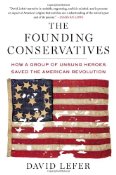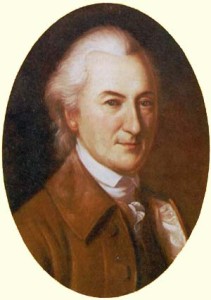
The Founding Conservatives by David Lefer
 How a group of unsung heroes saved the American Revolution.
How a group of unsung heroes saved the American Revolution.
The author’s thesis is that, contrary to popular perception, the American Revolution was wracked by bitter and often violent struggles between left and right. That is not an impression consistent with conventional histories of the nation’s founding.
The book opens with an episode that demonstrates the author’s premise. In the fall of 1779, a group of militiamen roughly seized four merchants and dragged them through the streets of Philadelphia. The armed men, equal parts hungry and angry because of the rising price of bread, headed to the home of James Wilson. Wilson, a wealthy lawyer and a staunch advocate of free enterprise, opposed the price controls the radicals championed.
America’s leading conservatives rushed to Wilson’s defense but, in the interim, the situation had gone from dangerous to lethal. When the reinforcements arrived, the attackers had leveled canon at the door of the Wilson house. After the defenders’ volleys took militia lives, the mob fled, leaving their dead and wounded in the street.
The street fight had a seismic impact on public perception as well. Within a year, fear of the mob would lead to the decline of radical power and the ascendance of conservatism as the dominant political force in America for the next 20 years. Those two decades were among the most formative in American history, and during this time conservatives found themselves in a position to shape the new Republic, from rewriting the state constitutions and running the government under the articles of Confederation to drafting the Constitution and getting it ratified in the states.
Lefer’s book makes three main arguments. Primary among them is that the founding conservatives saved the American Revolution. Second, is that they brought capitalism to America because they were the first advocates of banking, corporations and large-scale industry in America. Third, is that modern conservatism was borne at the moment of independence and, although it parallels Britain’s, American conservatism differs because it reflects America’s unique history and culture.
In the course of his well-written and painstakingly researched book, the author acquaints readers with panoply of astonishingly talented and accomplished individuals. Beginning with John Dickinson and his powerful Letters from a Pennsylvania Farmer to the Inhabitants of the British Colonies, Lefer traces the careers and contributions of each conservative founder.
James Wilson, who studied law under Dickinson was one of America’s finest legal minds and drafted much of the Constitution. Robert Morris, who helped defend Wilson’s home during the Fort Wilson riot, served as America’s first chief justice, established the United States Navy, and personally bankrolled the Continental Army as well as much of the American economy. John Jay crafted much of New York’s Constitution, served as president at of Congress, and secured American economic interests brokering the peace treaty with Britain. Philip Schuyler, an upstate New York patrician, orchestrated the military victory that changed the course of the war. Silas Deane of Connecticut secured the French aid that kept the American army alive. John Rutledge of South Carolina almost single-handedly saved the Deep South. James Duane, Gouverneur Morris, Robert Livingston, Edward Rutledge, Carter Braxton, and many others also played pivotal roles in the Revolution. Yet, as consequential as these men were in their lifetimes, they have been largely forgotten today.
This book restores their rightful place in history. Regrettably, it is not possible to do them justice within the confines of a review. Lefer’s stirring accounts of these individuals and their contributions to the founding add color and drama to an oft told tale. Many historians, for example, have described the constitutional debates, but few have done so in as riveting a manner as this author.
Lefer calls his subjects “revolutionary conservatives.†But he could as well have designated them reluctant revolutionaries. Their initial goal was to protect colonists’ rights from an over-reaching Parliament and monarch, but remain part of the British Empire. While entreating the King to respect colonists’ liberties, they also worked to quell the radicals who wanted independence, not reconciliation.
Reluctant they might have been, but the founding conservatives were also realists who knew they had to prepare for a war they hoped would never come. And, as every school child knows, their repeated efforts to persuade the King to apply English law to English subjects were unsuccessful. By 1776, it was increasingly evident to the conservatives that Revolution was coming.
The conservatives had to decide where their allegiance lay, and it was not with the Loyalists. They were zealous defenders of American rights and committed Patriots.
By consenting to stand or fall with freedom, Dickinson, Morris, Rutledge, J, Braxton, and all their allies became America’s first true conservatives. They had passed through the final crucible. Change was inevitable, they knew, but by fighting so hard to keep it in check, they had saved America from being torn apart. Nor were they bitter about separating from Great Britain. As they saw it, they had not lost the battle over independence so much as they had ensured that the fledgling nation would now survive long enough to mount a credible challenge to British arms and found a real republican form of government.
The critical issue had become not whether to declare independence, but when. The conservatives knew they needed “time to establish American political and social institutions before the old British ones were swept away; time to strengthen and build the Army; time to establish a proper government; time to unite a still deeply divided populace.â€
 Although Dickinson and friends did not win all the time they sought, the 6-month delay they did manage was critical. At the onset of the war, almost all essentials were in short supply. That included medicine, clothes and, most vital of all, weapons and gunpowder. Robert Morris used his enormous network of commercial agents throughout Europe and the Caribbean to obtain the urgently needed supplies. He fronted the costs for these operations and became America’s chief weapons supplier. Radicals within and without Congress were appalled at the sums Morris and his company earned in the process.
Although Dickinson and friends did not win all the time they sought, the 6-month delay they did manage was critical. At the onset of the war, almost all essentials were in short supply. That included medicine, clothes and, most vital of all, weapons and gunpowder. Robert Morris used his enormous network of commercial agents throughout Europe and the Caribbean to obtain the urgently needed supplies. He fronted the costs for these operations and became America’s chief weapons supplier. Radicals within and without Congress were appalled at the sums Morris and his company earned in the process.
The radical position was not merely theoretical. Throughout the colonies, ad hoc committees were springing up to establish price controls, prevent monopolies, and threatened violence against anyone who made more money than was deemed acceptable. Attempts to regulate the economy were bound to succeed, radicals believe, because Americans, as a virtuous people, would gladly sacrifice their self-interest for the good of the state…
For the American right, this view was profoundly wrong. ‘Public virtue is not so active as private love of gain,’ John Jay countered. Far from making America stronger, he believed, the radical position would hinder the war effort and damage the economy… ‘Entrepreneurship was what America needed, not legislative interference. Only by unleashing the power of free enterprise would the colonies overcome the shortage of military supplies.
Carter Braxton of Virginia delivered the most spirited defense of the free market. Braxton believed the radical position was profoundly naïve. He said that Americans would forever demand the right to enjoy the fruits of their own labor “unrestrained by any ideal principle of governments” and to acquire property “without regarding the whimsical impropriety of being richer than their neighbors.”
Lefer points out that modern day conservatives would find many of the founding conservatives’ core beliefs surprisingly familiar:
… their faith in history and experience; their mistrust of theory and dogmatism; their support for venerable social institutions; their reverence for the military; their insistence on protecting property over a equality; their belief in yoking the interests of the rich and the powerful to the government; and their devotion to free-market capitalism.
The author also sees similarities to today in the Founders’ acrimonious political divisions.
The revolution was a time of war without end; real estate crashes, rampant speculation, and mounting public debt; popular outrage at bankers and merchants who grew rich while the rest of the nation struggled; bitter disputes over taxation; and of such animosity between left and right that it frequently left Congress paralyzed for months on end. Given the turbulence of the period, it’s unsurprising that the founders reacted more like us than their impressive marble likenesses would lead us to believe.
The radicals of the revolutionary generation linked protests against Great Britain with agitation for direct democracy. Their calls for greater political freedom and economic opportunity did not go unheeded. By the end of the Revolution, old barriers were giving way to greater social mobility and political participation. The opening of the West to land ownership by the common man blunted much of the egalitarian fervor. And conservatives forged a new, and widely appealing political ideology. They embraced and promoted the idea that economic growth would bring prosperity. It was a dynamic that worked well for more than two centuries.
Lefer has truly written a book for our time. His account of the founding conservatives is inspiring and cautionary. They had a better grasp of economics and governance than the egalitarian radicals of their time or, for that matter, the progressives of our time. Today’s left is again conjuring up the chimera of equality of result. Much has changed over the centuries, but human nature is constant. Envy, avarice and sloth are still malleable. A number of Americans neither hold certain truths to be self-evident nor connect the Founders’ legacy with liberty. Washington now chooses what doctors may be seen, what treatments are permitted and what health insurance may be purchased. It is tempting to say government doesn’t get more intrusive than that, but it wouldn’t be true. Despotism knows no limits.
 The posts are coming!
The posts are coming!


0 comments
Kick things off by filling out the form below.
Leave a Comment